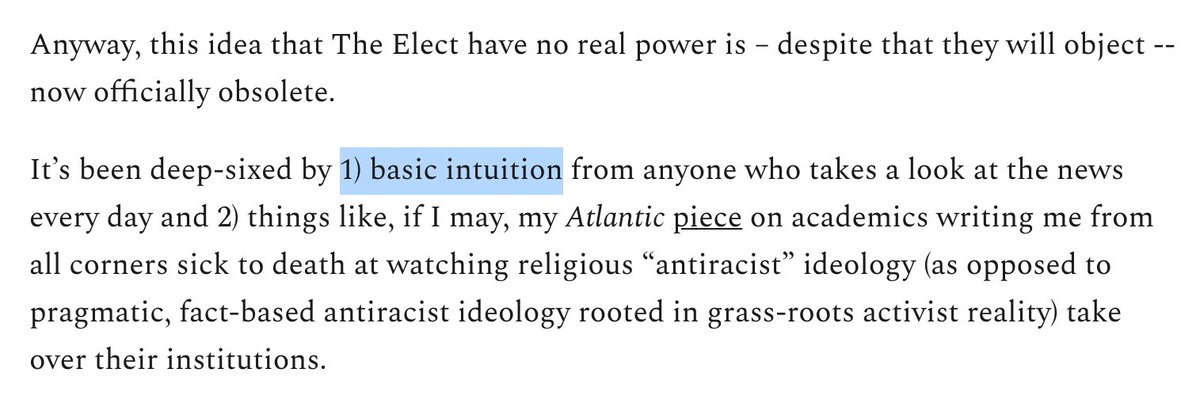
Wow. "Anti-Wokeism" is tearing itself apart with tone policing, ideological purity tests, and cancellation 

who could have seen this coming from people who think scanning texts for "postmodern" vocabulary is intelligent criticism
Anyway Young does indeed appear more concerned with Conversationalist James's hectoring tone and pandering manner than with the fact that he is a fraud who makes things up, so a plague on both your houses, etc, etc
"I hate inquisitions, that's why I'm issuing this simple guide to identifying and rooting out the crypto-woke who lurk insidiously among us, seeking to destroy us from within"
Update: the saga continues, and miraculously (or, to put it another way, predictably) both sides persist in being utterly unsympathetic
https://twitter.com/t_cutlet/status/1365942238828634112?s=20
It's nothing short of heartwarming that two sets of people both comfortable with making things up about *pretty much the same set of targets* and promoting *pretty much the same set of conspiracy theories* STILL can't get along
Probably no one made more hay out of James & Helen & Peter's silly stunt than Quillette -- hell, Jon Kay promoted Controversialist James as one of the, er, thinkers he gets most from following on here. So wailing that the leopard finally ate your face is... awesome, keep at it
Imagine arguing over who started bullshitting about "Critical Theory" first. Next they'll be measuring dicks over anti-freemasonry.
Who will get these clowns back in the clown car?
Who will get these clowns back in the clown car?
https://twitter.com/Katja_Thieme/status/1366046996897783812?s=20
I mean, what is the "logical" endgame for you when you are emotionally triggered by Theory... or is it just Black women online?
https://twitter.com/ArriLogC/status/1366049836982800387?s=20
It was always, always, always going to end this way. It was clear, to anyone really looking, from the start.
Let the mutual airbrushing begin!
https://twitter.com/deonteleologist/status/1366058855222759425?s=20
Claire's TL is split between people saying James is a better scholar, Claire panders to bourgeois academics, Claire shouldn't have used the r-word (it only makes James angrier), or Claire absolutely should use the r-word
High-level stuff! I can see why people publish w/Quillette



High-level stuff! I can see why people publish w/Quillette




Reminder that this is, in the end, a fight between two pseudo-intellectual critics of Left Academia, one of whom doesn't know what peer review is and the other of whom can't make sense of a newspaper 



I would like to end my coverage with a plea to the @nytopinion, which, you may not remember, featured Lindsay & Co. -- rooters-out of the "crypto-woke" -- as models of "disagreeing better".
Please, please, please do a "where are they now" follow-up!
nytimes.com/interactive/20…
Please, please, please do a "where are they now" follow-up!
nytimes.com/interactive/20…
• • •
Missing some Tweet in this thread? You can try to
force a refresh











